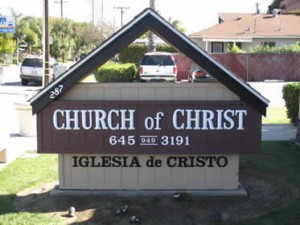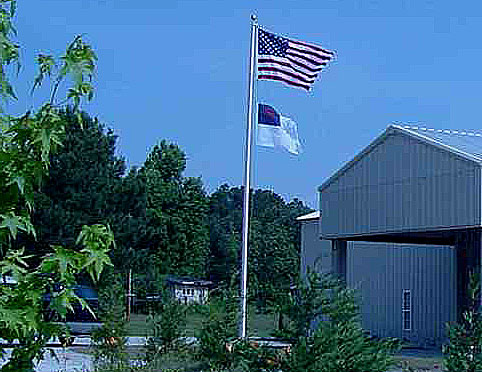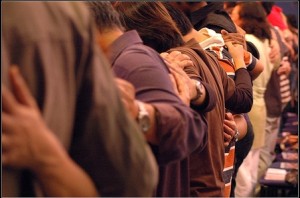“He called a little child and had him stand among them. And he said, ‘I tell you the truth, unless you change and become like little children, you will never enter the Kingdom of Heaven.'” ~Matthew 18:2-3
“Jesus said, ‘Let the little children come to me and do not hinder them, for the Kingdom of Heaven belongs to such as these.'” ~Matthew 19:14
 Why does Jesus hold up little children as the model citizens of the Kingdom? What is it about little children we’re supposed to imitate? What are we supposed to learn? What are we supposed to change? Unless you change and become like little children — forget about being the greatest in the Kingdom — you won’t even get in! What are we supposed to change?
Why does Jesus hold up little children as the model citizens of the Kingdom? What is it about little children we’re supposed to imitate? What are we supposed to learn? What are we supposed to change? Unless you change and become like little children — forget about being the greatest in the Kingdom — you won’t even get in! What are we supposed to change?
Jesus wants to teach us through little children. Jesus wants to use little kids to show us how to live, how to act, how to trust, how to have faith. He wants to show us through the children how to enjoy all of creation, how to play, how to chill out.
Little kids know God. Little children see Jesus.
In Matthew 21 it was the children who recognized Jesus as the promised Messiah. They knew it. They saw it. And they were shouting it and singing it at the tops of their voices. The religious leaders, in their irritation, approached Jesus and demanded an explanation. Do you hear what these kids are saying? Do you hear what these children are claiming? And Jesus says, “Duh!” (That’s the Message translation.) Jesus says, in essence, “What did you expect? Don’t you know Psalm 8? From the lips of children and infants you have ordained praise!”
Our kids will show us God. If we’ll only take the time to pay attention, our children will reveal Jesus to us.
We tried doing that together during our communion time this past Sunday. We had all the children stand up and raise their hands and then asked all our people to get out of their own seats to get close to a little child. Spend communion time this morning with a little kid. As we share the bread and the cup, as we remember Jesus, let’s listen to our kids. Maybe we’ll learn something from the children this morning. Maybe the kids will show us Jesus in a way we’ve never seen him before. Maybe our God will teach us something this morning he’s always wanted to teach us, but we’ve never slowed down to be with a little child long enough for it to happen. We suggested that our people ask the children a couple of questions during the Lord’s Meal: What is your favorite thing that Jesus ever did? What is your favorite thing that Jesus ever said?
Show us Jesus, kids. Lord, reveal yourself to us through the lips of these children.
I got up and walked a section over to sit right between Chloe and Creede, a brother and sister, kinda new to our congregation, whose dad was out of town on business. Perfect. Their mom and grandmother joined us. Excellent.
Creede is fourteen. All boy, through and through. The coolest thing Jesus ever did? Turning over the tables in the temple, obviously. Yes! His favorite thing Jesus ever said? Creede gave us his favorite Bible verse: I can do all things through Christ who strengthens me. Strength. Power. Might. Control. Yeah, that’s our Jesus. Sometimes I forget how strong our Lord is. Our culture wants us to believe Jesus was some skinny, pasty, white, wimp of a guy. A nerd. Oh, no. Not our King. He’s tough. That’s the Christ of my little brother, Creede. Thank you, God, for reminding me.
Chloe is eleven. All little girl, sugar and spice and everything nice, through and through. The greatest thing Jesus ever did? Healing the blind, making those blind people happy. Her favorite Bible verse? The joy of the Lord in Nehemiah 8:10. Yes! Our Lord is a Lord of happiness and joy, of laughter and glee. Sometimes I forget how happy Jesus was and how he filled everyone who met him with such joy. He left a trail of joy behind him everywhere he went. Our culture wants us to believe Jesus was some sour guy, somber and serious, bent on making us miserable with rule-following and sin-counting. No, that is not the Jesus of the Gospels. That is not the Jesus of the apostles. Our Christ came to give us life, abundant and to the full. That’s the Christ of my little sister, Chloe. Thank you, God for reminding me.
You might try it at your own church sometime. Spend communion time with the kids, talking to the kids, listening to them. Maybe God will reveal to you during the meal, through the children, something you need to see and learn. It’s an exercise that might make us more like Christ. And it might eternally impact the kids.
Peace,
Allan










Recent Comments